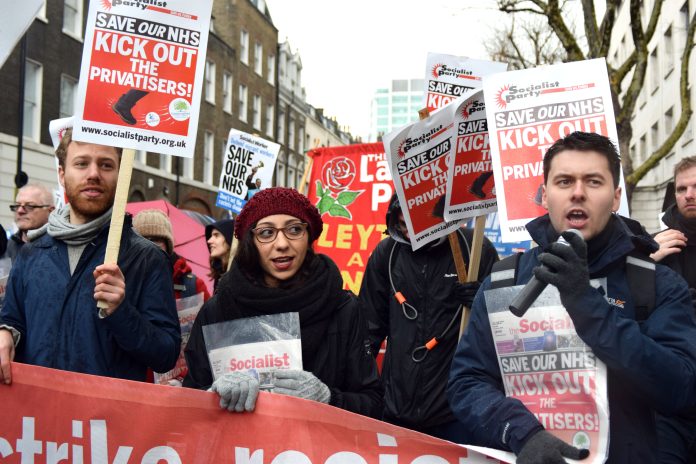Jon Dale, secretary, Unite Nottinghamshire Health Branch
Tory MPs voted against setting up the NHS in 1948, but it immediately proved so popular they were forced to accept it. It proved useful to private business in the following years of low unemployment, treating workers so they could return to work. But as the post-war economic boom ended, Tory opposition re-emerged.
In 1974, Tory MP Sir Keith Joseph (later in Margaret Thatcher’s cabinet) called for an end to state involvement in ‘micromanaging’ the economy, including public services.
A confidential 1982 Tory memo suggested government aiming to end state provision of healthcare over an extended period, with those unable to pay for private insurance having their charges met by state rebates.
In 1985, Tory MPs Oliver Letwin and John Redwood (both later cabinet ministers) proposed moving slowly through a number of options: making the NHS an independent trust, increasing joint ventures with the private sector, extending charging, introducing a system of health credits (or vouchers), and finally moving to an insurance scheme. Letwin wrote in 1988 that such ideas are “in origin a political rather than an economic or financial act”.
The Tory party has been itching for decades to get healthcare back in the private sector, so its big business backers could profit from the NHS’s huge sums of public money. But, although large chunks have been privatised, most of the NHS is still publicly owned and run.
Tory ambitions have not been fully realised because of the enormous opposition they run into. Threats to close hospitals or community health services are so unpopular that even local Tory MPs, supporting cuts and privatisation, are pushed to oppose the plans – often trying to shift the axe elsewhere.
Tory governments from 1979-97 moved towards their goal, in particular by introducing the ‘market’ into the NHS. This began turning health care into a commodity to be bought and sold, instead of a public service to meet need.
Faster travel down this route came with Tony Blair’s New Labour government. Foundation Trusts, billions of pounds of PFI debt, Independent Sector Treatment Centres, and other roads opened up, funnelling public money into private coffers.
Profit-making healthcare providers spread still further under the Tory-Lib Dem coalition and Tory governments since. Private providers delivered just 0.02% of all NHS-funded non-emergency treatment in 2003-04, but 5.2% in 2020-21.
This figure would be much higher if it included mental health services, care of the elderly and adults with learning disabilities, dentistry and many other areas of healthcare now mostly run for profit.
Spending on non-NHS providers has increased 70% since 2012-13 – from £10.8 billion to £18.3 billion after adjusting for inflation – while total planned Department of Health day-to-day spending increased just 42%.
How much further can privatisation go before the NHS stops providing healthcare directly, instead awarding contracts to profit-seeking companies to provide services?
A big problem for privatising zealots is that healthcare can be very expensive to provide – private companies like to cherry-pick. Simple operations like eye cataracts can be performed relatively cheaply without needing overnight stays. In 2016, 11% of NHS cataract procedures in England were delivered by private companies. Five years later that had grown to 46%.
200 specialist eye doctors signed a letter warning that “the accelerating shift towards independent sector provision of cataract surgery” is having a “destabilising impact” on safe provision. The loss of training opportunities for junior doctors and loss of trained staff to the private sector risks future treatment of complex eye conditions the private sector is not interested in.
On 20 June the government announced the award of a £25 million contract to US data firm, Palantir, now in pole position to win a £480 million contract running the new NHS Federated Data Platform. It paid £1 for its first NHS contract, awarded by ex-health secretary Matt Hancock during the pandemic without having to tender.
Palantir’s billionaire founder and chair, Peter Thiel, donated $1.25 million to Trump’s election campaign. Earlier this year he said the NHS “makes people sick” and it needs “market mechanisms” to fix it.
Controlling all the health information currently held by the NHS, including GP and social care records, potentially gives the company a priceless resource. Palantir, set up with CIA money and with military contracts, uses FTI Consulting to lobby the UK government for its interests.
A member of Labour’s National Executive, Abdi Duale, is an FTI director, as is Gemma Doyle. She is also a director of Progressive Britain, the right-wing Labour group with shadow health secretary, Wes Streeting on its Advisory Panel.
It’s clear whose interests a Labour government will be ‘progressing’ – and it won’t be patients, health workers and all those wanting a publicly owned, fully financed and democratically run NHS. A new mass workers’ party with a socialist programme must be built if the NHS is to be saved.
While only one person in England waited longer than 12 hours to be seen in A&E in August 2010, by October 2022 more than 43,000 people suffered a 12 hour wait








